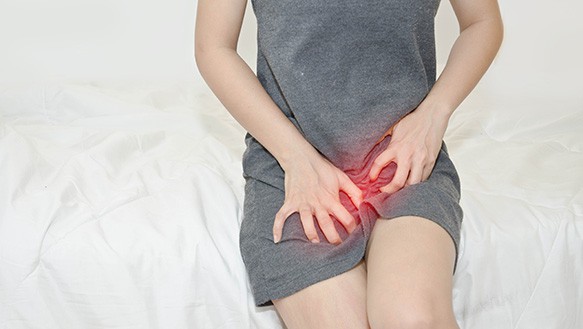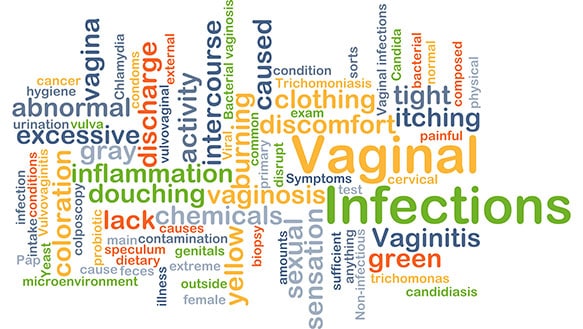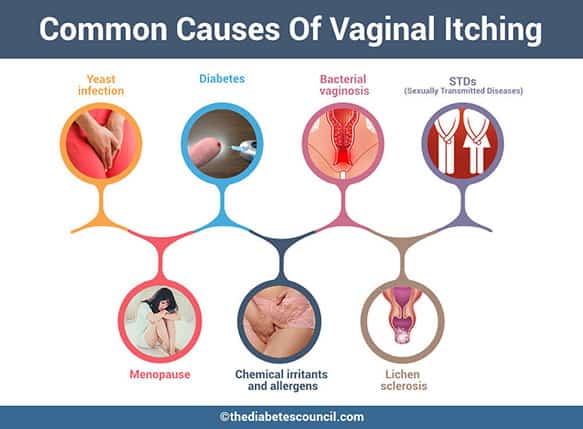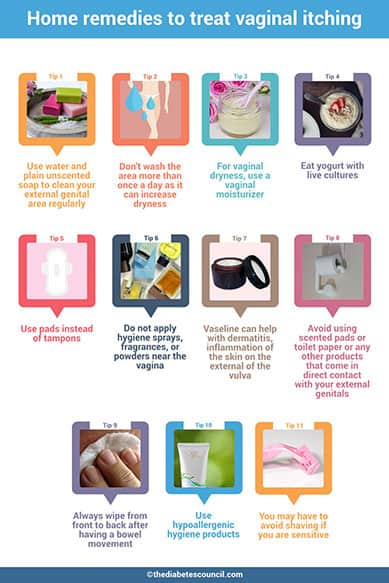What’s worse for a woman than a constant burning vaginal itching? For me, not much. It can cause severe discomfort for weeks, especially if it’s out of control.

Sometimes, they even come with red bumps and inflamed skin on the inside of the thighs. With a severe case, you are unable to urinate without burning, frequency and urgency.
It’s those times that you will find yourself waking up in the middle of the night and feeling the urgent need to urinate right away. You run for the bathroom, but only a few drops come out. It burns. Not to mention the discharge and odor. All of this is not so pleasant.
What are the causes, symptoms and treatments of vaginal itching?
After reading this article, you should be able to track down the causes, symptoms and treatments for the times when you’ve been hit with the nagging itch that just won’t go away.
Even as much of a nuisance as vaginal itching is, it’s not always due to a condition that can’t be cured with some medication or changes in hygiene practices. Sometimes, it’s a yeast infection or bacterial vaginosis that can be cured easily in most cases.
Other times, itching in the vaginal area and wall, as well as the skin around it, can be from a more serious cause such as an STD (Sexually Transmitted Infection) or diabetes. Though these can be treated, if left untreated, they can cause serious problems, such as arthritis or PID (Pelvic Inflammatory Disease) with prolonged chlamydia infection.
For more reading related to vaginal itching, refer to our “She Shed” article, Diabetes and Yeast Infection: The most relevant connection.
Angel’s story
Angel had numerous yeast infections that caused her severe pain and itching in the valvular area of her vagina. She also had many pin point red bumps that would leak clear fluid and spread to the skin in the groin and to the folds of her skin.
She had tried over-the-counter creams and suppositories, as well as the external creams. She finally gave up and went to see her doctor. Her doctor prescribed her a round of Diflucan pills. She took one pill a week for four weeks, which finally helped clear her yeast infections.
Angel was glad that the nagging itching was gone. Now when she gets even the least bit of itching down there, she calls her doctor right away. She also switched to wearing white cotton underwear, using only milk soap and not having douches anymore.
After speaking with her doctor, it was determined that she had been douching regularly and this may have contributed to her yeast infections and the pH imbalance in her vagina. Let’s see what else can cause vaginal itching, and what might be some ways to prevent it, treat it and generally deal with it.
Causes
Irritation, burning upon urination and itching in the vaginal area and groin can have multiple causes. Here, we will discuss six of the most common causes behind the itching. Besides the usual suspects, there are plenty of other culprits as well.
Yeast infection
The first culprit we’ll discuss about is the overgrowth of yeast. Our vagina has a delicate pH balance. When it’s upset, several things can overgrow causing that balance to be effected. When balance is off in the vaginal fluids, one of the things that can take hold and overgrow is yeast.
Called candidiasis or sometimes, thrush, vaginal yeast infections are common, and about 75 percent of women will get one at some stage of their lifetime. The yeast can also cause irritation, along with raised, tiny pustules that, if burst, can further spread the yeast infection.
Once yeast gets on the skin, it can have an excoriating affect, tearing off the top layer of skin. Itching is prevalent, along with a thick, white cottage cheesy discharge.
Sometimes the discharge has an unpleasant odor, and in severe cases, it can be in abundance. There’s lots of things you can do to prevent and treat yeast infections. We’ll get into those a little later.
Diabetes
Yeast infections are also more prevalent in people with diabetes. See our article on this subject linked above.
Bacterial vaginosis
Another common culprit of an itchy vagina can be BV or Bacterial Vaginosis. Remember that delicate balance of pH that exists in the vagina that we talked about?
When too many yeast get killed off, then too many of the “normal flora” bacteria can overgrow. Normal flora are the that bacteria that live normally in your vagina in a certain amount, but that can cause a problem if they take over and grow in number.
Think of it as a little army of soldiers – yeast and bacteria – trying to get along. One day, war breaks out where the bacteria kill the yeast, taking over control. This results in BV.
Besides an itchy vagina, you’ll have burning, a “fishy” smelling brownish or clear discharge and inflamed vulva. Vulva are the lips that surround the outer part of the vagina.
STDs (Sexually Transmitted Diseases)
Yeast and Bacterial Vaginosis are not considered as sexually transmitted. There are a whole host of STDs that one can come across through various sexual practices if no precautions are taken, or by having sex with multiple partners without proper proctection. IV drug users are also at risk of the blood and body fluid borne STDs, such as HIV and Hepatitis C.
Some of the most common sexually transmitted diseases include:
- Chlamydia
- Gonorrhoea
- Herpes (genital)
- Trichomoniasis
- Genital warts
- Syphilis
- HIV (AIDS virus)
- Hepatitis C
- Hepatitis B
Menopause
Ah, the change of life. I’ve been through it. It’s not much fun. With it can come a drop in some serious hormones that regulate your mood and your sex life. The walls of the vagina become thinner. There is more dryness and painful sex related to lack of lubrication.
The main hormone that drops is estrogen, but progestin levels also wreak havoc. It’s night sweats, drenched nightgowns, irritability and sleeplessness for some. It also puts you at greater risk for an itchy vagina.
Chemical irritants and allergens
Plenty of things can get your pH balance out of whack. Changing soaps or laundry detergents, using scented tissues, certain fabric softeners, body washes, creams and even dyes in underwear can irritate the natural balance in the vagina.
Many women complain of irritation when using condoms or other lubricants that help with dryness in their menopausal years. If you have an itchy vagina, try to remember if you have recently replaced any products for new ones, new clothes or anything that may affect your vaginal pH.
Are you taking baths? Do you frequent a hot tub? Many of these things can also play a part in how our vagina avoids itchiness.
Lichen sclerosis
One thing you may have not thought of related to vaginal itchiness is Lichen sclerosis. In fact, you may have never heard of it. It’s rare, and it tends to cause white patches on the skin. This can occur on the outer lips of the vagina, or the vulva.
It’s not temporary, but a more permanent scarring that occurs on the vaginal wall. Women who have been through menopause may develop this condition. It results in vaginal itchiness as well.
General symptoms that go along with vaginal itchiness
Here are some of the general symptoms you may get along with the irritating itchiness in your vagina:
- Itching
- Swelling
- Burning
- Discharge which is odorless white or clear
- Discharge which is green, yellow or gray
Treatments for itchy vagina
Let’s see what kinds of treatments are available so you can treat your symptoms.
The irritation can get better on its own
Sometimes the vagina just resets its own pH. Many women rely on probiotics and yogurt to help maintain a balanced vaginal pH. It’s possible that if you are itching for a day or two, it may clear up on it’s own.
For severe cases, consult your doctor
If it doesn’t clear up on its own, its time for a doctor or gynecologist to evaluate your situation. Most General Practitioners and Internal Medicine doctors can also perform a pelvic exam also but make sure to ask first if they perform the procedure.
They will sample your vaginal discharge to find what is the cause
When you get a pelvic exam, they will put you up on the exam table and have you scoot down to the edge and put your feet in some stirrups. There is usually some felt cloth over them, so they are not cold.
You will be draped with only your vagina exposed. If it’s a male doctor performing the examination, you will usually have another female nurse present. If not, ask for one if that makes you feel more comfortable.
They will place a speculum in your vagina to open the vaginal wall to view the cervix inside. They will use long sterile swabs to obtain the sample to send to the laboratory for testing.
You may also have a urine sample done for chlamydia, trichomoniasis and BV. The rest is sent to the lab. It’s not a procedure most women look forward to, but it’s not painful and it doesn’t last too long.
Depending on what condition is causing the itching, treatments differ
If it’s BV causing your itching, your treatment may be a cream or Flagyl (metronidazole) pills to take twice daily for seven days. Infections that are hard to clear may require clindamycin or a stronger antibiotic.
If it’s a yeast infection, you may get creams, suppositories or Diflucan pills. I’ll refer you again to our great article on yeast infections linked above under the same heading.
STIs are treated with antibiotics
Most STDs are treated with antibiotics. They may require a large single dose of antibiotics, such as with gonorrhea or chlamydia.
Gonorrhea has been switched to being treated by Rocephin injections, but this may have changed since I was last in a STD clinic. At any rate, there will be antibiotics, and you will need to abstain from sexual activity for seven days so you do not transmit it to your partner.
Thrush is treated with antifungal medication
If the yeast has started to affect the skin around the vagina, it’s most often called thrush. This is usually treated with topical creams.
Itching related to menopause can be treated with oestrogen cream or tablet
For menopause-related itching, replacing the depleted hormones with creams or tablets may take care of the problem or lessen it.
Others can be treated with steroid creams or lotions
Some vaginal itching may require steroid creams or specially medicated lotions. The important thing is to get it diagnosed first since there are more than a handful of causes and you want to the appropriate treatment in order to get rid of it.
Home remedies for treatment
Yogurt, probiotics, and vinegar cloths have been used and found to be helpful. If your infection is severe, it’s not likely to get rid of it. The best thing to do is to perform preventative measures. In other words, take care of your vagina.
Some tips for preventing vaginal itching are listed below. Taking care of this important area of your body can pay off in the long term:
- Use water and plain unscented soap to clean your external genital area regularly
- Don’t wash the area more than once a day as it can increase dryness
- For vaginal dryness, use a vaginal moisturizer
- Eat yogurt with live cultures
- Use pads instead of tampons
- Not applying hygiene sprays, fragrances, or powders near the vagina
- Vaseline can help with dermatitis, inflammation of the skin on the external of the vulva
- Avoid using scented pads or toilet paper or any other products that come in direct contact with your external genitals
- Always wipe from front to back after having a bowel movement
- Use hypoallergenic hygiene products
- You may have to avoid shaving if you are sensitive
FAQs
How long does it take for a vaginal itching to go away on its own vs when treated with medication?
Generally, after your diagnosis and treatment, you should see symptoms start to subside in a week or so.
When should I consider seeing my doctor?
When the itching is increasingly getting uncomfortable, it’s time to go get the doctor to determine the cause and get treated before symptoms get worse for you.
Could hormonal imbalance also cause vaginal itchiness?
Yes, hormonal imbalances can cause itching. See your doctor if you are having itching during premenopausal, menopausal or post-menopausal periods.
Could vaginal itching be a sign of vulvar cancer?
Yes, valvular cancer can cause itching. Other symptoms of it are bleeding and possible lumps on the vaginal lips. The skin on the vulva may be pale or discolored. Pain may also accompany symptoms. See your doctor if you experience these symptoms.
How can I treat vaginal itchiness during pregnancy?
Your doctor will let you know what you can use to treat vaginal itching during pregnancy. Don’t use any medications during pregnancy, even over-the-counter, if you are pregnant without first consulting with your physician.
What does severe vaginal itching feel like?
It’s the kind that has you digging into your groin non-stop with no relief at sight. It can be painful and cause burning sensations, and it can upset your quality of life.
What is the smell of the discharge like?
Discharge can range from smelling like fish, such as with BV, to a very foul odor and greenish discharge like trichomoniasis. Some infections may have a faint odor.
I have vaginal itching after sex. What should I do?
Make sure to take a shower after each time you have sex. If itching continues, see your doctor.
How can apple cider vinegar help?
Apple vinegar soaks can help to re-balance the pH in your vagina, which may relieve itching in some mild cases. It’s unlikely to cure more severe infections.
Do over the counter creams help relieve the pain?
Over the counter creams can be used, but you must first determine the source. You wouldn’t want to treat BV, for example, with a yeast cream. It wouldn’t do any good.
Over to you
We hope you learned something in today’s “She Shed” article. Let us know what you learned, and what you thought of the article in the comments box below. If you have any suggestions let us know as well.
TheDiabetesCouncil Article | Reviewed by Dr. Jack Isler MD on May 30, 2020
References












